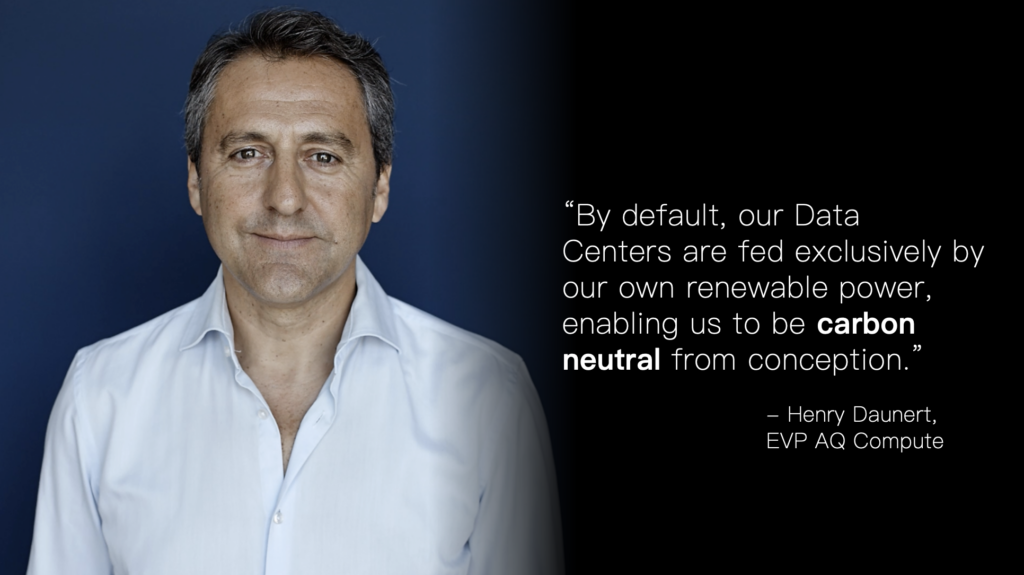Data Center technology: what are the innovations that will drive the sector towards efficiency and zero emissions?
Featuring a Q&A with Henry Daunert, EVP at AQ Compute, and a successful Data Center entrepreneur with over 30 years experience in the sector.
Over the past few years, the data centre industry has seen the rise of innovative technologies aimed at driving advancement in sustainability.
In this article, we have interviewed Henry Daunert, who pioneered the Modular Data Center and other breakthrough technologies over the past 20 years, selling his company later on to Schneider Electric.
In the past 12 months, Henry has been part of the foundation of AQ Compute, a new net zero Co-location provider that will set new standards in data decarbonisation. We ask Henry to share with us his view of what is the next big thing ahead.
Q: Why do you claim AQ Compute will set new standards in data decarbonisation?
AQ Compute was born with a huge competitive advantage vs. most other Co-Lo providers. We are a business unit of Aquila Capital, one of the largest producers of renewable energy across Europe with 14 GW of installed renewable power production, either Solar, Wind and Hydro. By default, our Data Centers are fed exclusively by our own renewable power, enabling us to be carbon neutral from conception. This is the first time that a Renewable Energies company creates a Data Center business unit and not the opposite.
Whilst most Data Center Companies are trying to achieve Net Zero targets in the next years, we are already there since day 1. We have also done extensive work on ESG Scope 2 and 3. All that gives us and our Co-Location clients a great advantage in the quest for Carbon Neutrality. Our goal at AQ Compute is to pioneer Data Center Circularity.

Q: What are the technologies that you are implementing to achieve Carbon neutrality?
AQ Compute Data Centers will operate at highest levels of efficiency. To start with, we have set servers‘ cooling temperatures in the upper range of ASHRAE recommendations. We have also implemented heat reutilisation. In addition, we offer various cooling technology options as air and liquid cooling. Liquid cooling is where the industry is heading to and we are ready to provide top efficiency and economic savings to our clients in the next future. Also the use of bio fuels for Gensets. Beyond Carbon neutrality, we pay also a lot of attention to water neutrality too for which we have also implemented several innovations.
Q: In your various projects, what has been the most effective technology implementation that has driven ESG results?
From the computing perspective, in the last 10 years the large scale adoption of virtualization / cloud in all its forms has changed the CPU utilization rate dramatically, boosting servers and Data Center energy efficiency into new levels.
Renewable energy supply for Data Centers through PPAs has been another boost to ESG.
From the physical infrastructure side, is all mainly related to cooling efficiency: simple actions such as raising servers’ operational temperature and an accurate cold/hot corridor enclosure save billions of dollars and tons of CO2e emissions to the Industry. In addition, direct and indirect free cooling, which we already started to implement 15 years ago, as well as heat reutilization, liquid cooling, all drive PUEs below average levels.
Other additional ways to improve ESG targets: a closer look into Scope 3 and the possibility to select equipment according to their recyclable capabilities and CO2 footprint, use specific recycled equipment like the ones offered by CIRKLA.
As mentioned, water neutrality is another important challenge. And finally, how to deal with excess installed capacity in Data Centers more efficiently.
Q: Are legacy data centres at a disadvantage if their technology is outdated? Do new data centres have the advantage?
Data Centers today represent about 4% of CO2 global emissions and can be expected to increase steadily and significantly over the next decades, so this topic is becoming more and more important.
Society in general and U.N.´s Sustainable Development Goals adopted by many Companies are creating more pressure to reduce CO2 footprint and in consequence build more efficient Data Centers.
Legacy Data Centers face some serious challenges in terms of keeping up with the efficiency requirements of ESG goals of their clients. New Data Centers offer a significant efficiency edge that legacy sites often cannot match.
Additionally, new standards and regulations are pushing more and more towards energy efficiency. For instance the new German Energy Efficiency Act (ENEfG) that is in the process of being implemented requires that at least 30% heat reutilisation takes place before a data centre could acquire a license. This is a great step in the right direction
The Hyperscalers pledge towards carbon neutrality is pushing the rest of the industry towards neutrality. The pressure that Hyperscalers place on the rest of the industry pushes the sector towards these goals.
New Data Centers will provide more efficiency improvements but that has to be explained very clearly in order for the public and governments to understand how Data Centers are enablers of the digital economy and the digital society
AQ Compute is one of Europe’s newest data centre companies. Their mission is to help decarbonise data by implementing sustainability into their DNA. Click here to find out more.

